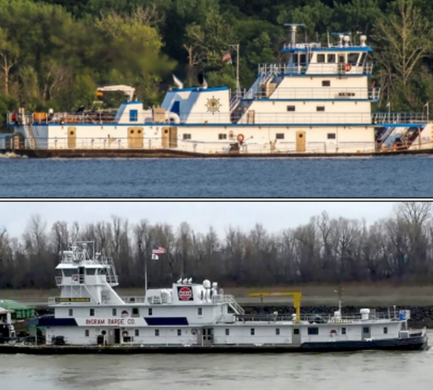
US National Transportation Safety Board (NTSB) determined the cause of the tow collision which resulted in minor injuries, barge damages, and the release of around 1,380 gallons of ethanol into the waterway.
A towing vessel pilot incorrectly recalling the agreed-upon passing arrangement led to tows colliding last year in the Mississippi River, the NTSB said on February 8.
The incident took place on January 9, 2023 when the towing vessel Big D was pushing 19 barges downbound on the Lower Mississippi River, and the towing vessel Carol McManus was pushing 42 barges upbound on the river.
At 0152 local time, the two tows collided at mile 312 near Fort Adams, Mississippi, causing the barges in both tows to break free.
Several barges were damaged in the collision, and about 1,380 gallons of ethanol spilled into the waterway. Two minor injuries were reported, whilst damages to the barges were estimated at $1.36m.
As it is reported by NTSB, the probable cause of the collision between the Big D tow and the Carol McManus tow was the Carol McManus pilot incorrectly recalling the agreed-upon passing arrangement, which resulted in the Carol McManus tow encroaching on the downbound Big D tow.
According to the Inland Navigation Rules, when two vessels are meeting or crossing, each vessel shall signal its maneuvering intentions by using the vessel’s whistle or VHF radio.
About 20 minutes before the 19-barge Big D tow and 42-barge Carol McManus tow met at the bend near Fort Adams, Mississippi, the pilots navigating the tows agreed over VHF radio to a port-to-port passage.
The Big D pilot maneuvered his downbound tow toward the right descending bank.
The Carol McManus pilot incorrectly recalled the arrangement, as NTSB said, and also navigated his upbound tow toward the right descending bank.
“The pilots, noticing the danger of colliding, attempted to maneuver to avoid the collision, but there was insufficient time to do so before the tows collided,” as NTSB highlighted in its report.
“When one mariner proposes an arrangement to another, the other mariner should repeat back the proposed passing arrangement to ensure both parties have a shared understanding of the arrangement. The repeat-back also reinforces the agreed arrangement with each mariner,” NTSB added.


